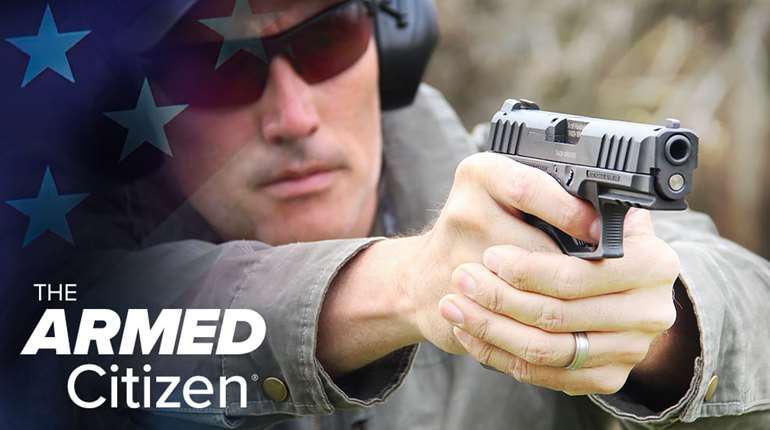
Ken Stok, a U.S. Army veteran, looked baffled as he stepped up to the podium before the Seattle City Council. He’d heard that his home city of Seattle was contemplating slapping gun owners with a “Gun Violence Tax.” Gun owners would have to pay a $25 tax on any gun they buy and a 5-cent tax on each round of ammunition (2 cents for .22-caliber) they purchase in the city to pay for harm caused by criminals who misuse guns.
Stok had fought in Afghanistan, gun in hand, to win and defend the freedom of a foreign country, and had come back home to “the land of the free and the home of the brave,” as Francis Scott Key put it. Now his city was debating whether it should punish him for choosing to exercise his Second Amendment rights? As soon as it was signed, the National Rifle Association, the NSSF, the Second Amendment Foundation, firearms retailers and private gun owners filed a lawsuit against the city of Seattle, alleging that its new firearms and ammunition sales tax ordinance is illegal and unenforceable.
Stok got right to the point. He asked the council members: “I want to know how my gun ownership is causing violence and crime?”
Stok wasn’t alone in asking that question. Other gun owners, as well as gun store owners and employees, also addressed the council—each hoping common sense might prevail.
Sergey Solyanik, owner of a gun store in Seattle named Precise Shooter, testified that the tax would force him to move his business outside city limits and so would deprive the city of revenue from his store. Mike Combs, president of Outdoor Emporium, Seattle’s largest gun retailer, said, “The city will lose more from current revenue than it would gain. … We bring in $1 million in tax revenue annually in the city of Seattle. … I’ve had a lot of customers tell me if this passes, they will take their business elsewhere.” In fact, Combs said the tax could force
Outdoor Emporium to move outside of the city or go out of business.
Even a state pre-emption law that forbids the state’s municipalities from enacting gun regulations didn’t sway the council. Trevor W. Santos, who does government-relations work for the National Shooting Sports Foundation (NSSF), testified that such a tax violates Section 9.41.290 of the Washington Code.
In the end, none of that mattered.
The Seattle City Council unanimously passed the “Gun Violence Tax,” and Seattle Mayor Ed Murray signed the measure. As soon as it was signed, the National Rifle Association, the NSSF, the Second Amendment Foundation, firearms retailers and private gun owners filed a lawsuit against the city of Seattle, alleging that its new firearms and ammunition sales tax ordinance is illegal and unenforceable. (The ordinance is slated to go into effect on Jan. 1, 2016. A failure to pay the tax is punishable by a fine of up to $5,000, imprisonment of up to 364 days, or both.)
Instead of listening to concerned gun owners and gun dealers, Seattle politicians opted to go along with people like Angela Christianson from south Seattle. She told the council: “It’s my right to live without fear. I don’t want my children to live in fear.”
Others echoed Christianson’s emotions, but none of them cited how forcing law-abiding people who chose to own guns to pay for criminal violence is going to reduce criminal behavior, and therefore their fear. Their resounding refrain was, “We have to do something.” Yet they didn’t even ask how the funds would specifically be used to curb violence.
During public debate, council members didn’t even pretend to answer Stok’s question about how his gun ownership—and that of others like him—is causing violence and crime. Instead they opted to treat law-abiding people who chose to exercise their freedom as if they are the problem. The ramifications of this, and what’s to come, are worth making clear.
Why This Tax Is Illegal
First, Seattle doesn’t have the legal authority to enact this Gun Violence Tax because it violates Section 9.41.290 of the Washington Code:
“The state of Washington hereby fully occupies and pre-empts the entire field of firearms regulation within the boundaries of the state, including the registration, licensing, possession, purchase, sale, acquisition, transfer, discharge, and transportation of firearms, or any other element relating to firearms or parts thereof, including ammunition and reloader components. Cities, towns, and counties or other municipalities may enact only those laws and ordinances relating to firearms that are specifically authorized by state law, as in RCW 9.41.300, and are consistent with this chapter. Such local ordinances shall have the same penalty as provided for by state law. Local laws and ordinances that are inconsistent with, more restrictive than, or exceed the requirements of state law shall not be enacted and are pre-empted and repealed, regardless of the nature of the code, charter, or home rule status of such city, town, county, or municipality.”
Why Seattle’s Rationale Doesn’t Add UpIn truth, the tax will make guns more expensive, which particularly burdens poorer people and thereby does make it harder to own a gun. Also, no matter what they say, this tax will financially penalize gun owners.
To get an explanation of why Seattle’s city council and its mayor think gun owners should have to pay a “Gun Violence Tax,” we went straight to the source and asked Seattle City Council President Tim Burgess, the tax’s chief proponent, for an explanation. His legislative aide, Nate Van Duzer, responded: “The purpose of the tax is not to make it harder to own guns or punish gun owners, but rather to raise a revenue source that will provide broad-based public benefits and address in part the millions of dollars in hard costs (and hundreds of millions in soft costs like lost earning potential) of gun violence in our region.”
In truth, the tax will make guns more expensive, which particularly burdens poorer people and thereby does make it harder to own a gun. Also, no matter what they say, this tax will financially penalize gun owners.
If revenue really is the council members’ only motive, why weren’t they swayed by the fact that the city will actually lose tax money if gun owners take their business outside city limits? If that contention is too speculative, then so is Seattle’s City Budget Office’s estimate that the Gun Violence Tax will raise between $300,000 and $500,000 annually.
Combs, the president of Seattle’s Outdoor Emporium, repeatedly said his store pays $1 million annually in taxes to the city. If that is true—and it wouldn’t be hard for the Council to verify—that alone more than doubles the City Budget Office’s optimistic revenue projection from the tax.
Why You Should Be Angry
To justify this tax, in 2013 the Seattle City Council funded research by the Harborview Injury Prevention and Research Center, which is affiliated with the University of Washington and Harborview Medical Center in Seattle. This research led to a report that found: “Gun violence begets gun violence.” It determined that individuals hospitalized for a firearm injury are 30 times more likely to be rehospitalized for another firearm injury. This finding mirrored a New York City recent report, which determined that the victims and perpetrators of most gun violence are usually the same few people. The New York Police Department found that roughly 200 to 300 individuals, most of whom are young men, are responsible for most of the gun violence in New York City. These same people tend to also be victims of gun violence.
So instead of honestly looking at this finding and concluding that they need to do something to target this small but violent criminal class, the Seattle City Council opted to punish the tens of thousands of law-abiding gun owners and, as they did, to insinuate that those who own guns are the problem.
The claim that hunters, those who have a gun for self-defense and those who shoot competitively or recreationally are the drivers of gun violence is so untrue—this would mean that rural areas with higher gun-ownership rates must therefore have higher homicide rates than inner cities—that Lawrence Keane, senior vice president and general counsel for the NSSF, said, “Seattle’s Gun Violence Tax is akin to taxing licensed pharmacists to combat an illegal drug epidemic.”
What This Tax Would Fund
What Seattle really wants to do is make legal gun owners pay for anti-gun studies and negative gun advertising.
When asked how the tax dollars would be spent, the official reply from the Seattle City Council was: “The Council has not determined which specific programs will be funded with these funds yet; those determinations will happen each year in the Council’s annual budget process. However, one example that Tim [Seattle City Council President Tim Burgess] has talked about (and is interested in funding) is the … proposed hospital-based intervention program. In the 1990s, a similar intervention approach was piloted in Seattle to reduce hospital visits for those suffering from alcoholism, and was so successful that it has been adopted across the country. Other cities have started to implement hospital-based intervention programs, and Harborview wants to add to this growing body of research.”
When you follow the money, you find that Harborview’s official explanation of what its Injury Prevention & Research Center does is this: “The Violence Section mission is to generate and disseminate new knowledge pertaining to prevention and treatment of violent injury, and their vision is to reduce the burden of violence-related morbidity and mortality through research, education and public awareness.” What Seattle really wants to do is make legal gun owners pay for anti-gun studies and negative gun advertising.
“Public awareness” includes, in one form or another, public ad campaigns. Given the ideological position of the Seattle City Council, this indicates that any gun owner who pays this tax would be funding anti-gun research and advertising. In reality, this would treat lawful gun owners and the firearm industry like “big tobacco” was treated back in the 1990s.
But there is even more to it than that. This Harborview model the Seattle City Council’s president wants to use would create a program where trauma-center physicians and social workers would stay in communication with victims of gun violence, mimicking treatment services for those dealing with alcohol or substance abuse. This idea was instituted in the mid-1990s. Patients hospitalized with alcohol-related injuries at Harborview met with a psychologist for 30 minutes before being discharged. They would discuss alcohol-consumption habits, the consequences of alcohol, and a “menu of strategies” that might help them avoid harmful behavior.
When treating alcoholism, the program has reportedly had positive results. But do gun owners need psychological counseling? Is the Seattle City Council’s view of gun owners really that extreme? If they would be simply targeting those few hundred people who are most often involved in gun violence, then do they really believe a social worker is going to talk a gang member out of turf wars and drug trafficking? Perhaps that is worth trying, as it isn’t likely to do harm. But even so, why should lawful gun owners have to pay for this criminal behavior—the very violence many people buy a gun to protect themselves and their loved ones from?
What The Future Holds
The Seattle Gun Violence Tax is now being challenged in court, but don’t assume this is just a Seattle issue. In 2013, two Democratic congressmen proposed new federal taxes on handguns and ammunition. They want to send the revenues to urban programs they say might reduce gun violence. Named the “Gun Violence Prevention and Safe Communities Act,” the bill, sponsored by U.S. Rep. William Pascrell, D-N.J., and Rep. Danny Davis, D-Ill., would nearly double the current 11 percent tax on handguns, while raising the tax on ammunition from 11 percent to 50 percent!
Many anti-gunners note that pro-gun and hunting conservation groups often brag about paying Pittman-Robertson taxes (the previously mentioned 11 percent tax), as the funds must be used for conservation programs, to fund public gun ranges, and other initiatives as defined by law and administered by state wildlife agencies. And in fact, most purchasers are proud to contribute to that purpose. However, requiring gun owners to pay for gun violence, which more often occurs in places with the nation’s strictest anti-gun laws, is obviously counterintuitive and unfair. Does punishing law-abiding behavior for the acts of criminals really make sense?
If there is any doubt left that this Gun Violence Tax is all about anti-gun ideology, consider that Seattle’s city attorney, Peter Holmes, said while testifying for this tax that he is part of “Prosecutors Against Gun Violence,” an anti-gun rights group. Holmes also said he plans to take the issue for consideration to other jurisdictions.
The idea that gun owners should pay for gun violence started in Cook County, Ill., where they have a similar $25 gun tax (they dropped an ammo tax). NSSF’s Keane said, “I am not aware of any other local jurisdictions imposing taxes specifically on guns and/or ammo for the alleged purpose of combatting gun violence. We are, however, concerned about gun control groups, e.g., Lawyers Committee Against Violence (“smart gun laws”), Bloomberg, etc., pushing local ordinances, even where there is state pre-emption. This is definitely a new tactic being deployed by the anti-gun movement. The Seattle law was modeled on Cook County’s tax, which was advanced by Chicagoland anti-gun groups and politicians.”

































